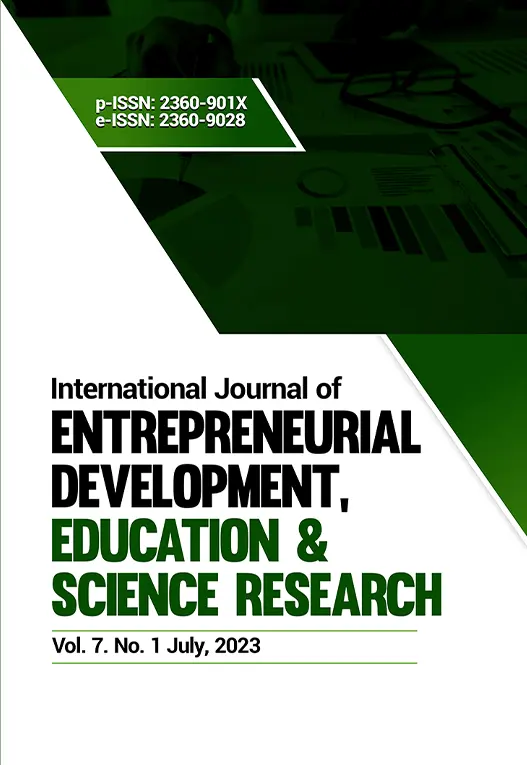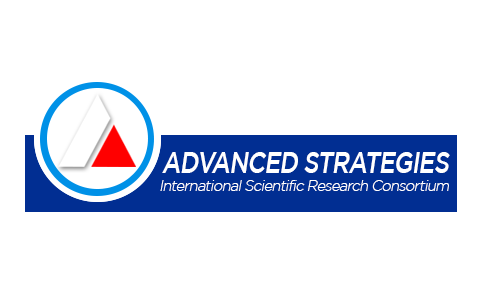
MENU

The International Journal of Entrepreneurial Development, Education and Science Research (IJEDESR) takes an interdisciplinary approach and focuses on qualitative and quantitative research in all areas of management, business innovations, entrepreneurship education and science.
1Michael Enyoghasim, 2Tobechi Abganike, 3Vincent O. Odoh, 4Ikwor Ogbonnanya, 5Ikechukwu Eze Okereke, 6Elechi Ogbonnaya Okpara & 7Okereke Chukwu Ugwu
1,2,4,5&7Dept. of Economics and Dev. Studies, Alex Ekwueme Federal University Ndufu,
3Dept. of Mass Communication, Alex Ekwueme Federal University Ndufu, Nigeria
6Department of Accountancy, Ebonyi State University, Abakaliki, Nigeria
1Isa Hezekiah Grace, 2Marvelous A. Eunice & 3Aigbedion Marvelous
1&3Department of Economics, Bingham University Karu, Nasarawa State, Nigeria
2Department of Educational Management, Nasarawa State University, Keffi
1Ogbonnaya Ikwor Okoroafor, 2Nwani Chinazaekpere, 3Agbanike Tobechi, 4Ogbuagu Regina Anuli 5Lasbrey Anochiwa & 6Cletus Onwuka
1,2,3,4,5&6Department of Economics and Development Studies, Alex Ekwueme Federal University, Ndufu Alike, Ebonyi State Nigeria
1Mathias Drehmann, 2Mikael Juselius & 3Anton Korinek
1Head of Secretariat, Markets Committee, Bank of International Settlements Basel, Switzerland
2Research Adviser, Monetary Policy and Research Department Bank of Finland, Helsinki
3David M. Rubenstein Fellow Economic studies, Centre on Regulation and Markets Brookings Institution, Washington D.C.
1Ekima Ayibaene FrankOputu & 2Mary Allen Agih
1Department of Social Science Education, Faculty of Education,
2Department of Educational Foundations, Faculty of Education, Niger Delta University, Wilberforce Island, Bayelsa State Nigeria
1Beke Adewale Jethro, 2Nwafor Chidi Patrick, & 3Aigbedion I. Marvelous
1Department of Economics, Federal University Lokoja, Kogi State,
2&3Department of Economics, Bingham University Karu, Nasarawa State
1Femi Ogunjobi Emmanuel & 2Kayode Adeyemi-Benson
1&2Bowen University, Iwo, Osun State
1Aisha Dan Iya Sulaiman & 2Mode Marafa
1School of General Education Department of Educational Foundations, Shehu Shagari College of Education Sokoto
2Department of Curriculum and Instructions, Shehu Shagari College of Education Sokoto
1Victoria Kwakwa & 2Aloysius Uche Ordu
1Vice President for Eastern and Southern Africa, World Bank, Washington D.C.
2Senior Fellow and Director, Africa Growth Initiative, Global Economy and Development, Brookings Institution, Washington D.C.
1Amiriheobu, Frank Ifeanyichukwu, 2Ojobah, Christian, 3Felix Nwokocha I. & 4Eke Felix
1Department of Theatre Arts Education, School of Arts and Social Sciences,
2&3Department of Educational Foundation, School of Education,
4Department of Building Technology, School of Technical Education, Federal College of Education (Technical) P.M.B 11, Omoku, Onelga, Rivers State, Nigeria.
1Titus Nezekolizibe & 2Okpu Tarela Oboro
1&2Department of Management, Faculty of Management Sciences, Niger Delta University, Wilberforce Island, Bayelsa State, Nigeria
Nathaniel C. Ozigbo
Department of Business Administration University of Abuja, Abuja – Nigeria
Opata J.O.C.
Chemical, Petroleum and Gas Engineering, Federal University Otuoke Bayelsa State
Abiodun Olalere Akere
Department of Music, Delta State University, Abraka, Delta State
1Sulaiman T. H., 2Ajiteru, S. A. R. & 3Abalaka, J. N.
1&3Crown University Intl Chartered Inc. Faculty of Social Science, USA,
2Department of Political Science & International Relations Achievers University, Owo, P.M.B.1030 Owo Ondo State Nigeria
Poazi Deinmodei W. Francis
Department of Management, Faculty of Management Sciences, Niger Delta University, Nigeria

